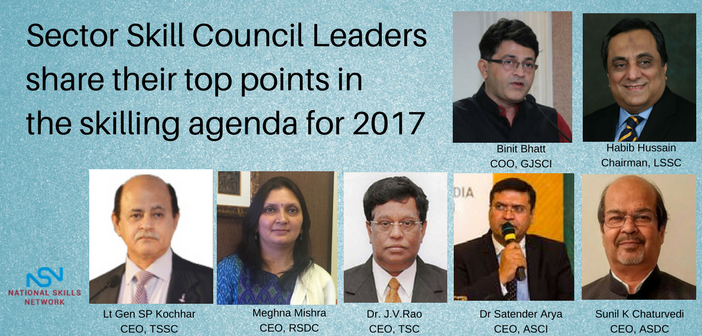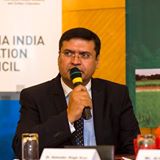Sector Skill Councils (SSCs) play a pivotal role in bringing the industry perspective and helping the skilling programs become demand-driven. As we begin the New Year 2017, Team NSN caught up with the leaders of some of the SSCs to learn about their priority agenda for effective design and implementation of various skill development initiatives in India. (This article has 7 pages. Click the NEXT button on top to view all the pages.)
In this article, we feature 7 SSCs (presented in alphabetical order); it includes contributions from Dr Satender Arya, CEO, Agriculture Skill Council of India (ASCI), Sunil K Chaturvedi, CEO, Automotive Skills Development Council (ASDC), Binit Bhatt, COO, Gem and Jewellery Skill Council of India (GJSCI), Habib Hussain, Chairman, Leather Sector Skill Council (LSSC), Meghna Mishra, CEO, Rubber Skill Development Council (RSDC), Lt. Gen SP Kochhar (Retd), CEO, Telecom Sector Skill Council (TSSC) and Dr J.V. Rao, CEO, Textile Sector Skill Council (TSC). Let’s read on to know more about how these SSCs are gearing up to meet new challenges in their respective industry sectors.
 Let’s begin with the message from ASCI, to be followed by the leaders of other SSCs.
Let’s begin with the message from ASCI, to be followed by the leaders of other SSCs.
Dr Satender Arya, CEO, Agriculture Skill Council of India (ASCI)
 As you know, agriculture is a highly unorganized sector and it has some unique challenges. This year, our agenda is to facilitate the implementation government and non-government schemes in imparting skills in agricultural domain.
As you know, agriculture is a highly unorganized sector and it has some unique challenges. This year, our agenda is to facilitate the implementation government and non-government schemes in imparting skills in agricultural domain.
First point pertains to linking the trained candidates with the industry. Even though agriculture is predominantly an informal sector, in the skilling space, we will try to focus on whatever organized segments are available, however small in number they may be. We want to link up the trained candidates with the industry. This will help them in getting jobs that match their skills. We want to develop a platform where they can connect with the industry and this becomes the resource base for the industry to pick up the right candidates and meet their requirements.
Second, we will explore the promotion of non-PMKVY and non-government funded schemes that come under CSR and other corporate programs.
Third, content development is an area that requires lot of time and energy and this year we would embark on some of the initiatives in developing higher quality content, both for the participant handbooks and training manuals.













Comments 1